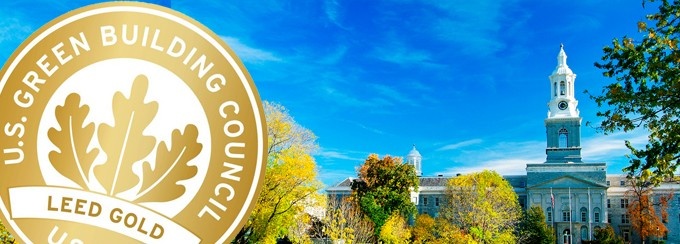Hayes Hall: The Renovation
Stewards of Sustainability, LEED Gold and Beyond

The Hayes Hall renovation is a core component of UB’s leadership in sustainability, both through research and teaching and the development and operation of its own campus. On track for gold certification under the U.S. Green Building Council’s Leadership in Energy and Environmental Design (LEED) rating system, Hayes Hall joins nine other LEED-certified facilities at UB, recognized for their best-in-class building strategies and practices.
As a significant undertaking in historic preservation and adaptive reuse, the project is fundamentally about stewardship in sustainability, a commitment that was carried forth from demolition to interior design.
Green building solutions include the replacement of all windows with high-efficiency alternatives. These new windows have also been custom-designed to match the building’s original wooden fenestrations, which were modernized in the 1980s with aluminum frames.
State-of-the-art mechanical and environmental systems, including natural ventilation throughout the building, not only bring Hayes Hall up to code, but enhance the building’s operational efficiency. From skylit fourth-floor studios to glass-paneled offices and classrooms, daylighting reduces the building’s energy needs and creates bright, inviting spaces.
Concrete, terrazzo and reclaimed wood flooring, new slate roofing and the restoration of select plaster walls reflect the project’s comprehensive use of durable materials and finishes. Where possible, products were also sourced from within a 500-mile radius of Buffalo. During the project’s demolition phase, contractors were able to recycle debris ranging from cast iron radiators to glass window panes.
The Hayes Hall project has served as an important teaching tool for the school, which recently launched a degree specialization in historic preservation. The project was also the focus of a continuing education workshop on sustainability in 2012 for practicing architects and planners.
For more than three decades, the University at Buffalo has worked to create a more sustainable campus and community through research, teaching, operations and community engagement. Read more about UB's leadership in sustinability.
